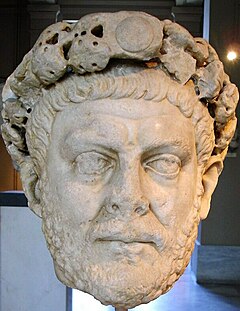
Diocletian, nicknamed Iovius, was Roman emperor from 284 to 305. Born to a family of low status in the Roman Province of Dalmatia, and originally named Diocles, Diocletian rose through the ranks of the military early in his career, eventually becoming a cavalry commander for the army of Emperor Carus. After the deaths of Carus and his son Numerian on campaign in Persia, Diocletian was proclaimed emperor by the troops. The title was also claimed by Carus's surviving son, Carinus, but Diocletian defeated him in the Battle of the Margus.
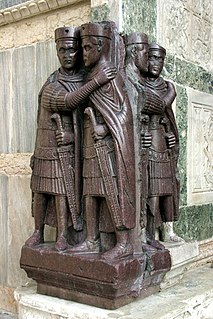
The Tetrarchy was the system instituted by Roman Emperor Diocletian in 293 to govern the ancient Roman Empire by dividing it between two senior emperors, the augusti, and their juniors and designated successors, the caesares. This marked the end of the Crisis of the Third Century.
The 290s decade ran from January 1, 290, to December 31, 299.
The 280's decade ran from January 1, 280, to December 31, 289.

Year 296 (CCXCVI) was a leap year starting on Wednesday of the Julian calendar. In the Roman Empire, it was known as the Year of the Consulship of Diocletian and Constantius. The denomination 296 for this year has been used since the early medieval period, when the Anno Domini calendar era became the prevalent method in Europe for naming years.

Year 293 (CCXCIII) was a common year starting on Sunday of the Julian calendar. In the Roman Empire, it was known as the Year of the Consulship of Diocletian and Maximian. The denomination 293 for this year has been used since the early medieval period, when the Anno Domini calendar era became the prevalent method in Europe for naming years.
Year 288 (CCLXXXVIII) was a leap year starting on Sunday of the Julian calendar. In the Roman Empire, it was known as the Year of the Consulship of Maximian and Ianuarianus. The denomination 288 for this year has been used since the early medieval period, when the Anno Domini calendar era became the prevalent method in Europe for naming years.

Flavius Valerius Constantius "Chlorus", also called Constantius I, was a Roman emperor as one of the four original members of the Tetrarchy established by Diocletian in 293. He was a junior-ranking emperor (caesar) from 293 to 305, and senior emperor (Augustus) from 305 to 306. Constantius was also father of Constantine the Great, the first Christian emperor of Rome. The nickname Chlorus was first popularized by Byzantine-era historians and not used during the emperor's lifetime.

Maximian, nicknamed Herculius, was Roman emperor from 286 to 305. He was Caesar from 285 to 286, then Augustus from 286 to 305. He shared the latter title with his co-emperor and superior, Diocletian, whose political brain complemented Maximian's military brawn. Maximian established his residence at Trier but spent most of his time on campaign. In late 285, he suppressed rebels in Gaul known as the Bagaudae. From 285 to 288, he fought against Germanic tribes along the Rhine frontier. Together with Diocletian, he launched a scorched earth campaign deep into Alamannic territory in 288, refortifying the frontier.
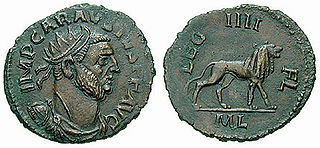
Marcus Aurelius Mausaeus Carausius was a military commander of the Roman Empire in the 3rd century. He was a Menapian from Belgic Gaul, who usurped power in 286, during the Carausian Revolt, declaring himself emperor in Britain and northern Gaul. He did this only 13 years after the Gallic Empire of the Batavian Postumus was ended in 273. He held power for seven years, fashioning the name "Emperor of the North" for himself, before being assassinated by his finance minister Allectus.

Allectus was a Roman-Britannic usurper-emperor in Britain and northern Gaul from 293 to 296.
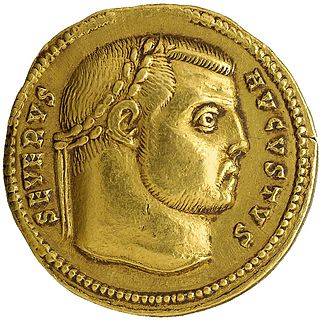
Flavius Valerius Severus, was a Roman emperor from 306 to the moment of his death, in September 307. After failing to besiege Rome, he fled to Ravenna. It is thought that he was killed there or executed near Rome.
Julius Asclepiodotus was a Roman praetorian prefect who, according to the Historia Augusta, served under the emperors Aurelian, Probus and Diocletian, and was consul in 292. In 296, he assisted the western Caesar Constantius Chlorus in re-establishing Roman rule in Britain, following the illegal rules of Carausius and Allectus.

The gens Flavia was a plebeian family at ancient Rome. Its members are first mentioned during the last three centuries of the Republic. The first of the Flavii to achieve prominence was Marcus Flavius, tribune of the plebs in 327 and 323 BC; however, no Flavius attained the consulship until Gaius Flavius Fimbria in 104 BC. The gens became illustrious during the first century AD, when the family of the Flavii Sabini claimed the imperial dignity.

The Eagle of the Ninth is a historical adventure novel for children written by Rosemary Sutcliff and published in 1954. The story is set in Roman Britain in the 2nd century AD, after the building of Hadrian's Wall.

The Lantern Bearers is a historical novel for children by Rosemary Sutcliff, first published by Oxford in 1959 with illustrations by Charles Keeping. Set in Roman Britain during the 5th century, it is the story of a British Roman's life after the final withdrawal of Roman troops. Sutcliff won the annual Carnegie Medal from the Library Association, recognising the year's best children's book by a British subject.

The Carausian revolt (AD 286–296) was an episode in Roman history, during which a Roman naval commander, Carausius, declared himself emperor over Britain and northern Gaul. His Gallic territories were retaken by the western Caesar Constantius Chlorus in 293, after which Carausius was assassinated by his subordinate Allectus. Britain was regained by Constantius and his subordinate Asclepiodotus in 296.
Events from the 3rd century in Roman Britain.
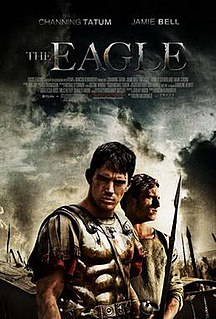
The Eagle is a 2011 epic historical drama film set in Roman Britain directed by Kevin Macdonald, and starring Channing Tatum, Jamie Bell and Donald Sutherland. Adapted by Jeremy Brock from Rosemary Sutcliff's historical adventure novel The Eagle of the Ninth (1954), the film tells the story of a young Roman officer attempting to recover the lost Roman eagle standard of his father's legion in Scotland. The story is based on the Ninth Spanish Legion's supposed disappearance in Britain. Historically, the purported disappearance of the Ninth Legion in Northern Britain is a subject of debate.
The Rogiet Hoard is a hoard of 3,778 Roman coins found at Rogiet, Monmouthshire, Wales in September 1998. The coins dated from 253 up until 295–296. The hoard notably contained several faulty issues, and some rare denominations, including those depicting the usurper emperors Carausius and Allectus.













